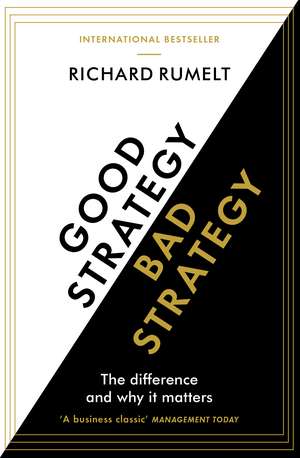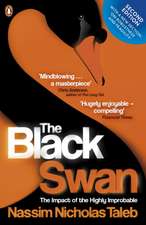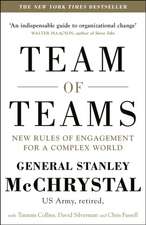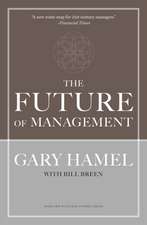Good Strategy/Bad Strategy: The difference and why it matters: Biblioteca Antreprenoria, cărți recomandate de Dan Ștefan, Autonom
Autor Richard Rumelten Limba Engleză Paperback – 6 sep 2017
| Toate formatele și edițiile | Preț | Express |
|---|---|---|
| Paperback (1) | 59.23 lei 3-5 săpt. | +22.27 lei 6-12 zile |
| Profile – 6 sep 2017 | 59.23 lei 3-5 săpt. | +22.27 lei 6-12 zile |
| Hardback (1) | 123.49 lei 3-5 săpt. | +25.20 lei 6-12 zile |
| Crown Business – 30 iun 2011 | 123.49 lei 3-5 săpt. | +25.20 lei 6-12 zile |
Din seria Biblioteca Antreprenoria, cărți recomandate de Dan Ștefan, Autonom
- 27%
 Preț: 68.40 lei
Preț: 68.40 lei -
 Preț: 264.14 lei
Preț: 264.14 lei - 19%
 Preț: 87.69 lei
Preț: 87.69 lei - 16%
 Preț: 69.10 lei
Preț: 69.10 lei - 15%
 Preț: 81.82 lei
Preț: 81.82 lei - 19%
 Preț: 67.77 lei
Preț: 67.77 lei - 16%
 Preț: 68.88 lei
Preț: 68.88 lei - 14%
 Preț: 72.35 lei
Preț: 72.35 lei - 16%
 Preț: 58.09 lei
Preț: 58.09 lei - 24%
 Preț: 63.06 lei
Preț: 63.06 lei - 15%
 Preț: 104.50 lei
Preț: 104.50 lei - 14%
 Preț: 72.63 lei
Preț: 72.63 lei - 20%
 Preț: 75.33 lei
Preț: 75.33 lei -
 Preț: 63.67 lei
Preț: 63.67 lei -
 Preț: 108.28 lei
Preț: 108.28 lei -
 Preț: 139.91 lei
Preț: 139.91 lei
Preț: 59.23 lei
Preț vechi: 70.22 lei
-16% Nou
11.33€ • 11.83$ • 9.38£
Carte disponibilă
Livrare economică 14-28 martie
Livrare express 27 februarie-05 martie pentru 32.26 lei
Specificații
ISBN-10: 1781256179
Pagini: 336
Dimensiuni: 128 x 198 x 24 mm
Greutate: 0.27 kg
Ediția:Main
Editura: Profile
Colecția Profile Books
Seria Biblioteca Antreprenoria, cărți recomandate de Dan Ștefan, Autonom
Locul publicării:London, United Kingdom
Notă biografică
Richard Rumelt is a professor at UCLA's Anderson School of Business. He also taught for several years at INSEAD in France, and has been a consultant to a wide range of organisations, from the Samuel Goldwyn Company to Shell.
Recenzii
A business classic
A milestone in both the theory and practice of strategy.
Good Strategy, Bad Strategy pinpoints the polar difference: The diagnosis and actions that constitute good strategy, the fluff and failures that cause the bad. Richly illustrated and persuasively argued by a researcher, teacher, and consultant, Richard Rumelt has authored the playbook for anybody in a leadership position who must think and act strategically.
Rumelt's new book clearly elevates the discussion of strategy. Using compelling examples and penetrating insights, Good Strategy/Bad Strategy provides new and powerful ways for leaders to tackle the obstacles they face. The concepts of "The Kernel" and "The Proximate Objective" are blockbusters. This is the new must-have book for everyone who leads an organization--business, government, or in-between.
Rumelt blends a practical focus with powerful conceptual ideas to provide an insightful guide for those wrestling with the challenge of creating strategy that makes a real difference.
In his provocative new book, Richard Rumelt lays bare an uncomfortable truth: Most companies have strategies that are quixotic, muddled and undifferentiated. This is hardly surprising, since in recent years the very idea of "strategy" has been dumbed-down by a deluge of naïve advice and simplistic frameworks. Rumelt cuts through the clutter and reminds managers that the essence of strategy is a clear and differentiated point of view that supports forceful and coherent action. Drawing on a wealth of examples, Rumelt identifies the critical features that distinguish powerful strategies from wimpy ones-and offers a cache of advice on how to build a strategy that is actually worthy of the name. If you're certain your company is already poised to out-perform its rivals and out-run the future, don't buy this book. If, on the other hand, you have a sliver of doubt, pick it up pronto!
Any executive reading this book will be motivated to examine the strategy of his or her firm, come to a judgment about it, and then work to develop or improve it. The many fascinating examples of good strategy provide great insight, but even more valuable are those of the `bad' variety. Rumelt writes with great verve and pulls no punches as he pinpoints such strategy "sins" as fluff, blue sky objectives, and not facing the problem.
There are many books on strategy but none as good and thought-provoking as Richard Rumelt's Good Strategy/Bad Strategy. Building on solid academic foundations and using fascinating examples from business, politics and history, Rumelt exposes the many fallacies that surround this important concept while providing his own unique and refreshingly-clear approach on how to develop a coherent and successful strategy. This is a wonderful book, full of fresh ideas and practical advice, written in a clear and engaging way. It will change the way we teach and practice strategy.
Cutting to the core of what makes the difference between success and being an also-ran, Rumelt uses vivid examples from the contemporary business world and global history that clearly show how to recognize the good, reject the bad, and make good strategy a living force in your organization. Everyone involved in creating and applying strategy and strategic thing must read this book. In a very crowded field like strategy, few books stand out. Richard Rumelt's new work is one of the exceptions.
Richard Rumelt reinforces that a strategy is not a goal or objectives. It is the battle plan for action that is designed upon a unique set of attributes or conditions (kernels) that sets an organization apart from its competitors (leverages) and results in exceptional and sustainable profits.
Books on corporate strategy are rare. Rarer still are ones that explain good versus bad strategy, through clear illustrations where organizations got it right or wrong. This is a must read for CEOs or planners whose job depends on getting it right!
Richard Rumelt's book, Good Strategy/Bad Strategy, is a must-read. It articulates the fundamentals of strategy and is exceptional in its depth and breadth of case illustrations and understanding on strategy. A book like this can only be written with many years of research and deep thought on the practice of strategy. I highly recommend this book to anyone interested in the field of strategy.
Descriere
When Richard Rumelt's Good Strategy/Bad Strategy was published in 2011, it immediately struck a chord, calling out as bad strategy the mish-mash of pop culture, motivational slogans and business buzz speak so often and misleadingly masquerading as the real thing.Since then, his original and pragmatic ideas have won fans around the world and continue to help readers to recognise and avoid the elements of bad strategy and adopt good, action-oriented strategies that honestly acknowledge the challenges being faced and offer straightforward approaches to overcoming them. Strategy should not be equated with ambition, leadership, vision or planning; rather, it is coherent action backed by an argument.For Rumelt, the heart of good strategy is insight into the hidden power in any situation, and into an appropriate response - whether launching a new product, fighting a war or putting a man on the moon. Drawing on examples of the good and the bad from across all sectors and all ages, he shows how this insight can be cultivated with a wide variety of tools that lead to better thinking and better strategy, strategy that cuts through the hype and gets results.



























